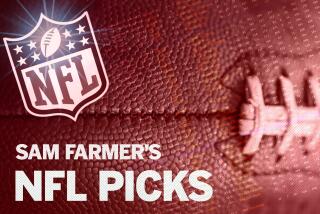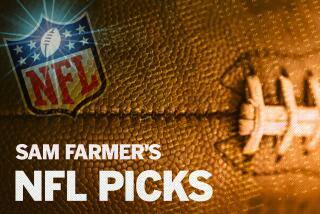Super-Sized Problem
- Share via
It seemed as if it would never end.
Season after NFL season, the Super Bowl belonged to the NFC. There were challenges to the throne -- including four straight failed attempts by the Buffalo Bills -- but each time the AFC was ushered offstage with a nice parting gift.
“It was an amazing run,” said Bill Walsh, former coach of the San Francisco 49ers, part of an NFC onslaught of 13 consecutive Super Bowl victories from the 1984 through ’96 seasons.
But it didn’t last. Not even close. In a remarkable reverse, AFC teams have won seven of the last nine Super Bowls, including the last three.
Not only that, but most of the NFL’s elite quarterbacks are in the AFC, among them Peyton Manning, Tom Brady, Carson Palmer, Ben Roethlisberger, Trent Green, Steve McNair, and now Miami’s Daunte Culpepper.
The NFC? Two of its biggest stars, Brett Favre and Kurt Warner, are on the down slope of their careers and wouldn’t surprise anyone if they decided to call it quits after this season.
Not that the NFC doesn’t have a handful of outstanding quarterbacks, among them Philadelphia’s Donovan McNabb and Carolina’s Jake Delhomme -- each of whom has been on the losing end of Super Bowls against New England -- and Atlanta’s Michael Vick.
There’s no definitive reason the AFC has been so dominant in recent years; the conferences don’t have rules variances such as, say, the designated hitter in baseball. But superior quarterback play could definitely be a factor.
Last season, for example, the top three regular starters in completion percentage all played in the AFC, as did the top four in touchdowns. Conversely, the five quarterbacks responsible for the most interceptions were all from the NFC: Favre, Eli Manning, Aaron Brooks, Drew Bledsoe and Delhomme.
ESPN analyst Steve Young, who won a Super Bowl as San Francisco’s quarterback, has a theory that AFC teams have done a better job of dealing with the salary cap and free agency, which began in the early 1990s.
“I can almost make a demarcation to 1997, the first win for the [Denver] Broncos,” Young said.
“That’s when free agency changed the game and the AFC teams took advantage of the disruption and established organizations that handled free agency better and faster, teams like New England, Denver, Indianapolis.”
Fellow analyst Michael Irvin, a former All-Pro receiver who won three Super Bowl rings with the Dallas Cowboys, sees a less subtle difference between the conferences. He said it all comes down to what happens after the ball is snapped.
“When the NFC was winning, when we were winning, we had physical play,” Irvin said. “The NFC was the brutal conference. We used to call the AFC softer. It’s the AFC that now plays physical football. This is a contact sport. When it comes down to it, it’s all about who’s willing to line up and bust somebody in the mouth.”
The Seattle Seahawks might beg to differ that AFC teams play a tougher brand of football. Their offensive line dominated the competition last season, paving the way for MVP running back Shaun Alexander. The Chicago Bears and Carolina Panthers, too, relied on their molar-rattling defenses to set the tone.
Still, the fact remains that the NFC ultimately has been outplayed in the last nine years, with the exceptions of St. Louis in 2000 and Tampa Bay in 2002.
Will that change any time soon?
“It could,” Walsh said. “I think Indianapolis is going to be right up there, and I feel like New England is going to come back.
“Our only hope might be Seattle.”
*
(BEGIN TEXT OF INFOBOX)
Times Staff Writer Sam Farmer ranks the conference 1-16:
1. Seattle Seahawks
* With their defense catching up with their proficiency on offense, Seahawks are poised to make another Super Bowl run.
2. Carolina Panthers
* The Panthers spent the off-season bulking up in the trenches, a place they broke down during the playoffs last season.
3. Chicago Bears
* Rex Grossman has an able backup in Brian Griese and a defense with no starter older than 30. The Bears could
be around the top for a
while.
4. Washington Redskins
* The Redskins are hoping their spend-spend-spend philosophy finally pays off on the field. But they still need a quarterback.
5. Dallas Cowboys
* Everyone’s waiting for the nuclear meltdown between Bill Parcells and Terrell Owens. That could be even more spectacular than a T.O. touchdown.
6. New York Giants
* The defending NFC East champs open with a doozy: Eli vs. Peyton at the Meadowlands.
7. Tampa Bay Buccaneers
* The Buccaneers have some budding stars on offense, but the window of opportunity is closing on their aging defense.
8. Philadelphia Eagles
* The challenge for Donovan McNabb is not so much physical as psychological. He must regain leadership of his team.
9. Atlanta Falcons
* Michael Vick needs help from his on-again, off-again defense if the Falcons
are to return to the play-
offs.
10. St. Louis Rams
* When then-coordinator Lovie Smith left the Rams, so did the team’s defensive capabilities. Now, Scott
Linehan is looking to change that.
11. Arizona Cardinals
* It’s only a matter of time until Matt Leinart steps in as the starting quarterback. You can bet he’ll miss USC’s offensive line.
12. Minnesota Vikings
* That the Vikings are in a lousy division certainly helps them. Keeping Brad Johnson upright will be the key to their success.
13. New Orleans Saints
* With Reggie Bush and Drew Brees, the Saints should be markedly better than last season’s 3-13.
14. Detroit Lions
* If nothing else, Coach Rod Marinelli will bring a discipline to the Lions that Steve Mariucci didn’t.
15. Green Bay Packers
* The Packers still have Brett Favre, but Mike McCarthy’s offense was horrible in San Francisco last season.
16. San Francisco 49ers
* If there’s a bright spot for the 49ers, it’s that Alex Smith has looked like a real NFL quarterback this summer -- poised and confident.
More to Read
Go beyond the scoreboard
Get the latest on L.A.'s teams in the daily Sports Report newsletter.
You may occasionally receive promotional content from the Los Angeles Times.











